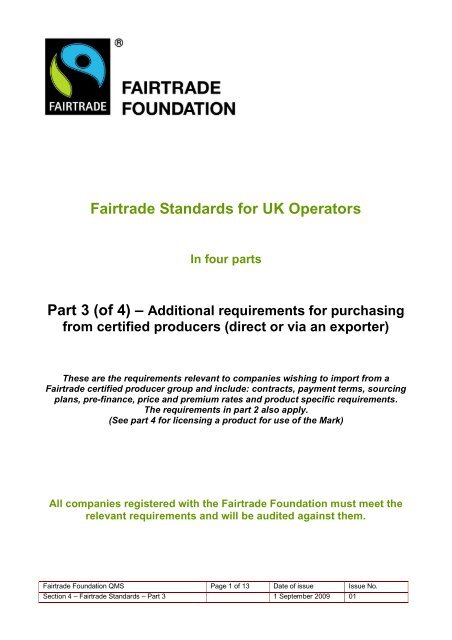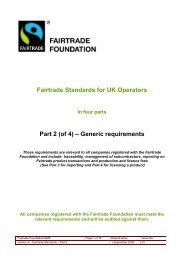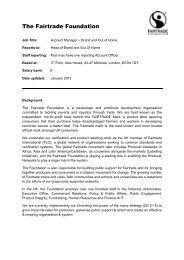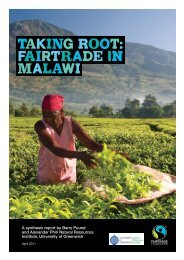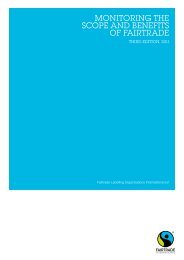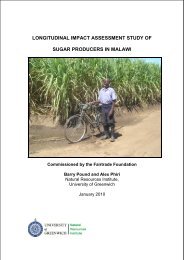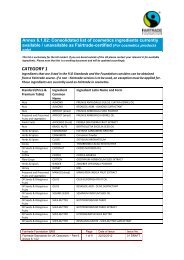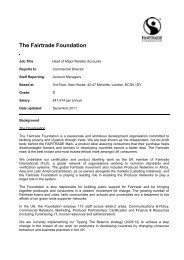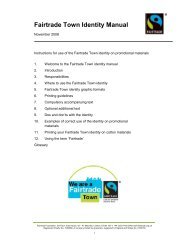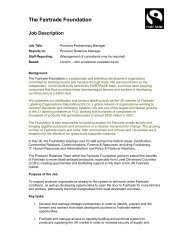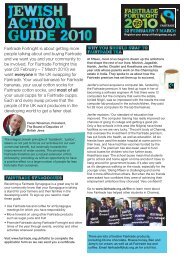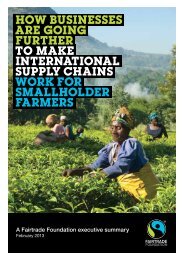Fairtrade Standards for UK Operators In four parts Part 3
Fairtrade Standards for UK Operators In four parts Part 3
Fairtrade Standards for UK Operators In four parts Part 3
Create successful ePaper yourself
Turn your PDF publications into a flip-book with our unique Google optimized e-Paper software.
<strong>Fairtrade</strong> <strong>Standards</strong> <strong>for</strong> <strong>UK</strong> <strong>Operators</strong><br />
<strong>In</strong> <strong>four</strong> <strong>parts</strong><br />
<strong>Part</strong> 3 (of 4) – Additional requirements <strong>for</strong> purchasing<br />
from certified producers (direct or via an exporter)<br />
These are the requirements relevant to companies wishing to import from a<br />
<strong>Fairtrade</strong> certified producer group and include: contracts, payment terms, sourcing<br />
plans, pre-finance, price and premium rates and product specific requirements.<br />
The requirements in part 2 also apply.<br />
(See part 4 <strong>for</strong> licensing a product <strong>for</strong> use of the Mark)<br />
All companies registered with the <strong>Fairtrade</strong> Foundation must meet the<br />
relevant requirements and will be audited against them.<br />
<strong>Fairtrade</strong> Foundation QMS Page 1 of 13 Date of issue Issue No.<br />
Section 4 – <strong>Fairtrade</strong> <strong>Standards</strong> – <strong>Part</strong> 3 1 September 2009 01
Contents<br />
3.1 to<br />
3.7<br />
Annexes<br />
Section Who should read this? Page<br />
Contractual arrangements between<br />
importers and producers<br />
3.8 Exceptions to <strong>Fairtrade</strong> standards –<br />
Retroactive product certification and<br />
product compensation<br />
Section<br />
Annex 3.1 <strong>Fairtrade</strong> price and premium<br />
All price/premium<br />
payers<br />
Price/premium payer –<br />
applying <strong>for</strong> an<br />
exception<br />
<strong>Fairtrade</strong> Foundation QMS Page 2 of 13 Date of issue Issue No.<br />
Section 4 – <strong>Fairtrade</strong> <strong>Standards</strong> – <strong>Part</strong> 3 1 September 2009 01<br />
4<br />
12<br />
Who should read this? Link<br />
3.1.01 <strong>Fairtrade</strong> price and premium table All price/premium payers Click<br />
here<br />
Annex 3.2 FLO Product Specific Trade <strong>Standards</strong> (see <strong>Part</strong> C)<br />
3.2.01 Bananas Small Producer Organisations <strong>Operators</strong> purchasing<br />
bananas from SPOs<br />
3.2.02 Bananas Hired Labour <strong>Operators</strong> purchasing<br />
bananas from HL<br />
3.2.03 Cocoa Small Producer Organisations <strong>Operators</strong> purchasing<br />
cocoa from SPOs<br />
3.2.04 Coffee Small Producer Organisations <strong>Operators</strong> purchasing<br />
coffee from SPOs<br />
3.2.05 Dried fruit SPO <strong>Operators</strong> purchasing<br />
dried fruit from SPOs<br />
3.2.06 Fresh fruit SPO <strong>Operators</strong> purchasing<br />
fresh fruit from SPOs<br />
3.2.07 Fresh fruit HL <strong>Operators</strong> purchasing<br />
fresh fruit from HL<br />
3.2.08 Fruit juices SPO <strong>Operators</strong> purchasing fruit<br />
juice from SPOs<br />
3.2.09 Fruit juices HL <strong>Operators</strong> purchasing fruit<br />
juice from HL<br />
3.2.10 Herbs & spices SPO <strong>Operators</strong> purchasing<br />
herbs/spices from SPOs<br />
3.2.11 Honey SPO <strong>Operators</strong> purchasing<br />
honey from SPOs<br />
Click<br />
here<br />
Click<br />
here<br />
Click<br />
here<br />
Click<br />
here<br />
Click<br />
here<br />
Click<br />
here<br />
Click<br />
here<br />
Click<br />
here<br />
Click<br />
here<br />
Click<br />
here<br />
Click<br />
here
3.2.12 Nuts & oil seeds SPO <strong>Operators</strong> purchasing<br />
nuts/oil seed from SPOs<br />
3.2.13 Quinoa SPO <strong>Operators</strong> purchasing<br />
quinoa from SPOs<br />
3.2.14 Rice SPO <strong>Operators</strong> purchasing rice<br />
from SPOs<br />
3.2.15 Cane sugar SPO <strong>Operators</strong> purchasing cane<br />
sugar from SPOs<br />
3.2.16 Soybeans & pulses SPO <strong>Operators</strong> purchasing<br />
soybean/pulses from SPOs<br />
3.2.17 Tea SPO <strong>Operators</strong> purchasing tea<br />
from SPOs<br />
3.2.18 Tea HL <strong>Operators</strong> purchasing tea<br />
from HL<br />
3.2.19 Wine grapes SPO <strong>Operators</strong> purchasing wine<br />
grapes from SPOs<br />
3.2.20 Wine grapes HL <strong>Operators</strong> purchasing wine<br />
grapes from HL<br />
3.2.21 Flowers and plants HL <strong>Operators</strong> purchasing<br />
flowers/plants from HL<br />
3.2.22 Seed cotton SPO <strong>Operators</strong> purchasing seed<br />
cotton from SPOs<br />
3.2.23 Sportsballs HL<br />
SPO = Small Producer Organisation. HL = Hired Labour.<br />
Please note the Annexes will be updated regularly – if you have printed this off please check the website <strong>for</strong><br />
the latest version.<br />
<strong>Fairtrade</strong> Foundation QMS Page 3 of 13 Date of issue Issue No.<br />
Section 4 – <strong>Fairtrade</strong> <strong>Standards</strong> – <strong>Part</strong> 3 1 September 2009 01<br />
Click<br />
here<br />
Click<br />
here<br />
Click<br />
here<br />
Click<br />
here<br />
Click<br />
here<br />
Click<br />
here<br />
Click<br />
here<br />
Click<br />
here<br />
Click<br />
here<br />
Click<br />
here<br />
Click<br />
here<br />
Sportsballs from HL Click<br />
here<br />
3.2.24 Fresh Veg SPO <strong>Operators</strong> purchasing from<br />
SPOs<br />
3.2.25 Fresh Veg HL <strong>Operators</strong> purchasing from<br />
HL<br />
Annex 3.3 Exceptions<br />
3.3.01 Foundation exceptions policy <strong>for</strong> producer<br />
certification in circumstances where FLO-<br />
CERT cannot inspect and certify producer<br />
organisations<br />
Annex 3.4 List of Current issues of Annexes<br />
3.2.34 List of Current issues of Annexes<br />
Price/premium payer –<br />
applying <strong>for</strong> an exception<br />
Click<br />
here<br />
Click<br />
here<br />
Click<br />
here<br />
All price/premium payers Click<br />
here
3. Contractual arrangements between importers and producers<br />
THIS SECTION APPLIES TO FAIRTRADE PAYERS – IMPORTERS RESPONSIBLE FOR<br />
PAYING THE FAIRTRADE PRICE AND/OR FAIRTRADE PREMIUM TO THE PRODUCER<br />
ORGANISATION OR CONVEYOR IN THE DEVELOPING COUNTRY<br />
3.1 Contractual arrangements<br />
(FLO GTS <strong>In</strong>tent) Contracts between producers and buyers set the framework <strong>for</strong> <strong>Fairtrade</strong> trade<br />
operations. It is important that the contractual obligations are mutually agreed, well documented, and<br />
clearly understood by the contracting parties.<br />
Guidance: The price and premium payer depends on which level the price is set in the FLO <strong>Part</strong> C<br />
Trade <strong>Standards</strong>:<br />
If the price is Farm Gate or Ex Works then the company buying from the producer organisation at the<br />
Farm Gate is the payer. This could be either an importer, a processor in the South or the exporter. If<br />
the price is set at FOB, and the producer organisation is exporting the product itself, then the<br />
importer is the payer. If the price is set at FOB, but the producer organisation is not exporting the<br />
product itself (i.e. there is an independent exporter) then technically the responsibility lies with both<br />
the exporter and the importer to ensure that the correct price and premium is paid. Typically, the<br />
importer is considered the payer (i.e. responsible <strong>for</strong> ensuring that the price and premium are paid)<br />
and the exporter is considered a conveyor (i.e. responsible <strong>for</strong> passing the correct price and<br />
premium on to the producer. <strong>In</strong> this situation, the importer pays the price and premium to the<br />
exporter who then passes the money on to the producer. Both (importer and exporter) are<br />
responsible <strong>for</strong> ensuring that the correct price and premium are paid.<br />
Alternatively if the Operator importing has a direct relationship with the producer they pay the<br />
premium directly to the producer, there<strong>for</strong>e in essence by passing the exporter.<br />
3.1.01 (FLO GTS 3.1) Buyers must sign binding purchase contracts with producers. Unless otherwise<br />
stated in the product standards, contracts must as a minimum clearly indicate:<br />
agreed volumes<br />
quality<br />
price<br />
payment terms<br />
delivery conditions<br />
arbitration mechanism agreed by both parties.<br />
Specific requirements in the <strong>Part</strong> C Trade <strong>Standards</strong> apply to: bananas, coffee, dried fruit, fresh fruit,<br />
fruit juices and soybeans and pulses. Please see Annex 3.2.<br />
FLO guidance: Contracts must be written <strong>for</strong> all products bought and sold under this standard.<br />
As a minimum, both parties must agree volumes, quality, price, payment terms and delivery<br />
conditions, and these agreed terms must be clearly stated in the contract.<br />
Any such additional requirements from the relevant product standards must be included in the<br />
agreed contract.<br />
Responsibility <strong>for</strong> drawing up the contract should be mutually agreed on. Where no agreement can<br />
be reached then the responsibility to draw up the contract rests with the buyer who must also ensure<br />
that the contract reaches the seller in an agreed language.<br />
The standard also requires that a mechanism <strong>for</strong> arbitration is written into contracts between<br />
producers and <strong>Fairtrade</strong> payers or conveyors.<br />
Suspension<br />
3.1.02 (FLO GTS 3.2) Where notice is made of a producer’s or buyer’s suspension from <strong>Fairtrade</strong>, signed<br />
contracts made be<strong>for</strong>e the date of notice will be recognised as valid <strong>for</strong> <strong>Fairtrade</strong> certified products<br />
<strong>for</strong> a maximum period of six months.<br />
FLO guidance: Existing <strong>Fairtrade</strong> contracts entered into be<strong>for</strong>e notice of suspension may be fulfilled<br />
if both parties (producer and buyer) agree.<br />
<strong>Fairtrade</strong> Foundation QMS Page 4 of 13 Date of issue Issue No.<br />
Section 4 – <strong>Fairtrade</strong> <strong>Standards</strong> – <strong>Part</strong> 3 1 September 2009 01
To be considered as certified, the product must be delivered within a time limit of six months.<br />
New <strong>Fairtrade</strong> contracts must not be signed after the date of the notice of suspension.<br />
Decertification<br />
3.1.03 (FLO GTS 3.3) Where an Operator is decertified, they must immediately stop buying or selling<br />
products as <strong>Fairtrade</strong> certified. This standard is applicable from the date of decertification. Contracts<br />
with a decertified Operator that have been fulfilled be<strong>for</strong>e the date of decertification shall be<br />
accepted. Contracts that have not been fulfilled at the point of decertification shall not be classified<br />
as <strong>Fairtrade</strong> contracts.<br />
FLO guidance: This standard makes it clear that from the date of decertification, <strong>Operators</strong> must not<br />
purchase products from, or sell products to, decertified <strong>Operators</strong> <strong>for</strong> sale as a certified product.<br />
The standard also clarifies that where a certified product from a decertified Operator has been<br />
delivered be<strong>for</strong>e the date of decertification, then it shall be accepted as certified. For example, in an<br />
FOB contract, if the product is on board be<strong>for</strong>e the decertification then it shall be accepted. Contracts<br />
that have not yet been delivered are no longer <strong>Fairtrade</strong> contracts.<br />
Disadvantageous terms<br />
3.1.04 (FLO GTS 3.4) Buyers must not offer to buy certified products from a producer on condition that the<br />
producer sells a quantity of non-certified product under terms that are distinctly disadvantageous to<br />
the producer.<br />
FLO guidance: This standard applies to <strong>Fairtrade</strong> payers who buy both certified and non-certified<br />
products from the same producer.<br />
The standard makes it a requirement that the purchase of non-certified products under terms that<br />
are distinctly disadvantageous to the producer must never be undertaken as a condition <strong>for</strong> certified<br />
purchases. The certifier will determine whether any given transaction can be considered as ‘distinctly<br />
disadvantageous’.<br />
Producers that feel they have experienced disadvantageous practices by <strong>Fairtrade</strong> payers should<br />
document their concerns and send these as a complaint to the certifier.<br />
Access to contracts by producers<br />
3.1.05 (FLO GTS 3.5) Producers must have access to the contracts signed between conveyors and<br />
<strong>Fairtrade</strong> payers.<br />
FLO guidance: This standard makes it a requirement that conveyors must give producers access to<br />
the contracts they have signed with <strong>Fairtrade</strong> payers. This means that on request from a producer,<br />
the conveyor must make a copy of the relevant contract(s) available to that producer.<br />
Quality claims<br />
3.1.06 Claims associated with specific consignments must be documented according to the relevant trade<br />
policy requirements on claims, and applications must be made within the required time periods.<br />
This standard relates to specific claims that may <strong>for</strong>m the basis of disputes between a producer and<br />
a buyer. The standard requires that <strong>Operators</strong> try to resolve any such disputes, but where this is not<br />
possible the Operator must document the claim according to the requirements of the relevant trade<br />
policy and must follow the certifier’s procedures <strong>for</strong> claims and resolutions where these exist.<br />
3.1.07 <strong>Operators</strong> must also comply with the FLO <strong>Part</strong> C Trade <strong>Standards</strong>, which specify additional<br />
requirements <strong>for</strong> some products – see the table in paragraph 3.6.01 <strong>for</strong> a summary.<br />
3.2 Sustaining trade<br />
(FLO intent) <strong>Fairtrade</strong> aims to create sustainable trade partnerships between producers and their<br />
buyers, which enable producers to have long-term access to markets under viable conditions. Above<br />
and beyond standards requirements, it is important that these relationships grow stronger over time<br />
and are based on mutual respect, transparency and commitment.<br />
Exchange of in<strong>for</strong>mation is one important element of the trade relationship, in particular <strong>for</strong><br />
producers. Sourcing plans allow producers to plan their production more effectively, and to ensure<br />
that they can deliver the required amounts of products (of the required quality) to buyers. The aim is<br />
<strong>Fairtrade</strong> Foundation QMS Page 5 of 13 Date of issue Issue No.<br />
Section 4 – <strong>Fairtrade</strong> <strong>Standards</strong> – <strong>Part</strong> 3 1 September 2009 01
to encourage buyers to facilitate the planning process <strong>for</strong> producers.<br />
Buyers are also encouraged to give any additional assistance they can mutually agree on with<br />
producers. Tools such as in<strong>for</strong>mation sharing, price updates, quality training, risk sharing plans and<br />
others should be considered.<br />
Sourcing plans<br />
3.2.01 (FLO GTS 4.1) Buyers (including those making purchases via marketing boards) must provide a<br />
sourcing plan to each producer from whom they plan to buy, as well as to conveyors, if applicable.<br />
Specific requirements in the <strong>Part</strong> C Trade <strong>Standards</strong> apply. Details of these are in Annex 3.2. <strong>In</strong> the<br />
<strong>Part</strong> C Trade <strong>Standards</strong> <strong>for</strong> flowers and bananas, the sourcing plan indicates which percentage of<br />
the sourcing plan is binding.<br />
FLO guidance: This standard makes it a requirement that every Operator planning to buy from a<br />
particular producer must provide a sourcing plan to that producer. The certifier will expect to see<br />
evidence that a sourcing plan has been provided to each producer. Wherever applicable, the buyer<br />
must also share a copy of the sourcing plan with the conveyor.<br />
Sourcing plans are developed with reference to qualities, quantities, dates of delivery or purchase,<br />
price or value as outlined in the product standards.<br />
Buyers are encouraged to use the buying pattern of the previous season or year as a guide <strong>for</strong> the<br />
development of their sourcing plans. <strong>In</strong> cases where no prior buying patterns exist (i.e. when the<br />
buyer, producer, or product is new within the trading relationship) the buyer should make a<br />
reasonable estimate.<br />
The applicable timing <strong>for</strong> the provision of sourcing plans to producers is further defined in the product<br />
standards.<br />
Any buyer who is purchasing a certified product that is exported via a marketing board must<br />
nonetheless provide a sourcing plan to the producer. Buyers may also consider sharing the sourcing<br />
plan with the marketing board to help planning.<br />
3.3 Pre-finance<br />
(FLO intent) Pre-finance is one of the core benefits <strong>for</strong> producers within the <strong>Fairtrade</strong> system. The<br />
intention of this section is to help producers gain access to reasonable <strong>for</strong>ms of financial assistance<br />
to support their purchases from members.<br />
Pre-finance should be provided as soon as possible after signature of contract to ensure that<br />
producers can make the most effective use of it.<br />
<strong>Fairtrade</strong> encourages traders to offer other <strong>for</strong>ms of financing or payment such as ‘pre-payment’,<br />
‘advance-payment’ and /or ‘crop-finance’ to producers. However, this standard refers to ‘pre-finance’<br />
only in relation to payments which are made against agreed contracts between producers and<br />
buyers <strong>for</strong> <strong>Fairtrade</strong> products. Pre-finance payments are payments which usually attract interest.<br />
The standards explicitly state that buyers may explore possibilities to seek pre-finance via third<br />
parties. However, the interest rates that the producer pays on such pre-finance agreements must not<br />
be higher than the buyer’s cost of borrowing from the third party.<br />
The percentage limitation <strong>for</strong> pre-finance represents the maximum that buyers are required to pay, if<br />
producers request it. However, buyers are encouraged to provide higher percentages of prefinancing<br />
if so desired by the producer, upon mutual agreement.<br />
3.3.01 (FLO GTS 5.1) Producers may request pre-finance from <strong>Fairtrade</strong> payers against agreed time<br />
periods and, where required, against specific quantities, unless otherwise specified in the product<br />
standards.<br />
(FLO <strong>Part</strong> C Trade Standard) The pre-finance requirements do not apply to bananas, sports balls,<br />
flowers and fresh fruit, <strong>for</strong> which pre-finance agreements are negotiated directly between the<br />
producer and the <strong>Fairtrade</strong> payer. For the other products, the <strong>Part</strong> C Trade <strong>Standards</strong> specify when<br />
the pre-finance has to be made available. These <strong>Part</strong> C Trade <strong>Standards</strong> are in Annex 3.2.<br />
Where marketing boards exist, pre-finance requirements are not applicable to the relevant products.<br />
FLO guidance: This standard makes it an option <strong>for</strong> producers to request pre-financing from<br />
<strong>Fairtrade</strong> payers. With this standard, the onus rests with the producer to request pre-finance against<br />
<strong>Fairtrade</strong> Foundation QMS Page 6 of 13 Date of issue Issue No.<br />
Section 4 – <strong>Fairtrade</strong> <strong>Standards</strong> – <strong>Part</strong> 3 1 September 2009 01
agreed contracts from the <strong>Fairtrade</strong> payer of that contract.<br />
<strong>Fairtrade</strong> payers may choose, with the agreement of the producer, to offer pre-finance, via a third<br />
party.<br />
Where producers feel that they are being coerced into not requesting pre-finance, they are<br />
encouraged to document a complaint <strong>for</strong> further investigation to the certifier.<br />
Cane sugar operators sourcing from Paraguay, Malawi, Mauritius and Zambia are exempt from prefinance<br />
requirements until 31 December 2009.<br />
3.3.02 (FLO GTS 5.2) Where pre-financing is requested and unless otherwise stated in the product<br />
standards, <strong>Fairtrade</strong> payers must provide pre-finance up to 60% of the contract value. The minimum<br />
percentage of the pre-finance must be defined by the producer.<br />
FLO guidance: Producers may request pre-finance of up to 60% of the contract value. Buyers must<br />
provide the pre-finance requested.<br />
Producers may use the <strong>Fairtrade</strong> minimum price level (where this exists) when calculating the prefinance<br />
value. For products that do not have minimum prices or when market prices are higher than<br />
the <strong>Fairtrade</strong> minimum price, then the contract value may be used.<br />
The level of the pre-finance must be determined by the producer, up to 60%.<br />
Where both parties are in agreement, pre-finance exceeding 60% of the contract value can be given.<br />
3.3.03 (FLO GTS 5.3) <strong>Fairtrade</strong> payers must make pre-financing available from the point of signature of<br />
contract onwards and not later than a specified time period as stated in the product standard.<br />
FLO guidance: This standard makes a distinction between making a request <strong>for</strong> pre-finance and the<br />
actual delivery of the pre-finance. While the request must be made when orders have been<br />
confirmed, this standard requires that the pre-finance is made effectively available <strong>for</strong> use (delivered)<br />
by the <strong>Fairtrade</strong> payer to the producer as soon as possible after the contract is signed. At the latest,<br />
pre-finance must be delivered within the time period determined in the product standard.<br />
3.3.04 (FLO GTS 5.4) Where a sufficiently high level of risk of non-repayment or non-delivery has been<br />
associated with a particular producer, and only where that level of risk has been assessed and<br />
verified via a third party lender, then the pre-finance requirements under standards 3.3.02 and<br />
3.3.03 do not have to be met.<br />
This standard gives an option to the <strong>Fairtrade</strong> payer to request from the certifier that requirements<br />
under standards 5.2 (3.3.02 above) and 5.3 (3.3.03 above) do not have to be met.<br />
The assessment mechanism will be via a third party lender. Where the <strong>Fairtrade</strong> payer views a<br />
particular producer requesting pre-finance as ‘high risk’, they must approach a third party lender to<br />
request pre-financing <strong>for</strong> the producer. Where the lender agrees, then this must be done. Where the<br />
lender undertakes an assessment and classifies the producer group as ‘high risk’ and will not<br />
provide pre-finance, then this assessment report from the lender must be submitted to the certifier.<br />
Where buyers are deemed to assess their producer partners persistently as being ‘high risk’, the<br />
certifier may request an additional verification from an additional third party lender. The interpretation<br />
of ‘persistently’ in this context will be determined by the certifier.<br />
<strong>In</strong>terest charges<br />
3.3.05 (FLO GTS 5.5) <strong>In</strong>terest charges on the pre-financed value must be agreed by both the buyer and<br />
the producer. They must not exceed the buyer’s current cost of borrowing (including administrative<br />
costs), and buyers are encouraged to make pre-finance available on better terms (at lower rates of<br />
interest) to the producer.<br />
FLO guidance: The buyer is allowed to charge interest on the pre-financed amount. The interest<br />
rate must not exceed the buyer’s cost of borrowing. Both parties must agree on the level of interest<br />
that is charged on the pre-financed amount.<br />
Agreement on the interest rate may include consideration of any administrative costs that have been<br />
incurred by the buyer in organizing and delivering the pre-finance.<br />
National and local legislation<br />
3.3.06 (FLO GTS 5.6) The requirements of local and national legislation take priority where they conflict<br />
<strong>Fairtrade</strong> Foundation QMS Page 7 of 13 Date of issue Issue No.<br />
Section 4 – <strong>Fairtrade</strong> <strong>Standards</strong> – <strong>Part</strong> 3 1 September 2009 01
with these requirements on pre-finance.<br />
FLO guidance: <strong>In</strong> cases where local and national legislation means that the <strong>Fairtrade</strong> payer is not<br />
legally permitted to pay pre-finance, this standard does not apply. <strong>In</strong> such cases, it is important that<br />
the <strong>Fairtrade</strong> payer communicates the legal restrictions to the producer.<br />
Contracts and credit agreements<br />
3.3.07 (FLO GTS 5.7) When pre-finance has been agreed upon, the <strong>Fairtrade</strong> payer must document either<br />
a separate pre-finance section within the contract or a separate credit agreement with the producer.<br />
FLO guidance: Under this standard, the provision of pre-finance must be documented as a separate<br />
section within the contract or as a separate credit agreement. This means that the pre-finance facility<br />
should be documented in a clear agreement including terms and conditions <strong>for</strong> both parties. This<br />
should include the amounts to be pre-financed, start dates, date of repayment, consignment contract<br />
details, rates of interest, and options <strong>for</strong> collection of payment (i.e. from the contract payments).<br />
3.4 Pricing<br />
(FLO <strong>In</strong>tent) The <strong>Fairtrade</strong> minimum price or relevant market price and the <strong>Fairtrade</strong> premium are<br />
core benefits of the <strong>Fairtrade</strong> system <strong>for</strong> producers. The payment of the <strong>Fairtrade</strong> minimum price and<br />
<strong>Fairtrade</strong> premium is a key function of those trade <strong>Operators</strong> that buy from producers and are<br />
responsible <strong>for</strong> paying the <strong>Fairtrade</strong> price (the ‘<strong>Fairtrade</strong> payer’).<br />
<strong>Fairtrade</strong> minimum prices are meant to protect and reduce the risks <strong>for</strong> producers in the event<br />
that market prices fall.<br />
<strong>Fairtrade</strong> minimum price<br />
3.4.01 (FLO GTS 6.1) <strong>Fairtrade</strong> payers must pay to producers at least the <strong>Fairtrade</strong> minimum price <strong>for</strong> the<br />
product contracted, where it exists, or the relevant market price where no <strong>Fairtrade</strong> minimum price<br />
exists. When the relevant market price <strong>for</strong> a product is higher than the <strong>Fairtrade</strong> minimum price, then<br />
at least the market price must be paid.<br />
FLO guidance: The <strong>Fairtrade</strong> minimum price of a product, where it exists, is the lowest possible<br />
price that the <strong>Fairtrade</strong> payer may pay to the producer. The <strong>Fairtrade</strong> minimum price is the starting<br />
point <strong>for</strong> price negotiations between the producer and the <strong>Fairtrade</strong> payer. When the relevant market<br />
price <strong>for</strong> a product is higher than the <strong>Fairtrade</strong> minimum price, then at least this higher market price<br />
must be paid.<br />
Both parties must keep evidence of the price level and how it was agreed. Either party can<br />
demonstrate the market price based on agreements/contracts with other clients/suppliers <strong>for</strong> a<br />
similar time period (if and when required).<br />
The <strong>Fairtrade</strong> minimum price includes any reference to organic prices or organic price differentials.<br />
<strong>Fairtrade</strong> payers must refer to the <strong>Fairtrade</strong> minimum price in<strong>for</strong>mation which is published<br />
separately in the FLO <strong>Fairtrade</strong> minimum price and <strong>Fairtrade</strong> premium table.<br />
The prices are specified in the FLO document – <strong>Fairtrade</strong> minimum price and <strong>Fairtrade</strong> premium<br />
table. www.fairtrade.net and in Annex 3.1.01.<br />
3.4.02 (FLO GTS 6.3) The price may be set, by mutual agreement, <strong>for</strong> any future delivery date, unless<br />
otherwise stated in the product standards.<br />
FLO guidance: This standard gives both the <strong>Fairtrade</strong> payer and the producer the option to<br />
determine when and how the price is fixed, unless this has already been defined in the product<br />
standards. This means that as long as both parties are in agreement about when and how the price<br />
is fixed and the requirements under standard 3.4.01 above and 3.4.06 below have been met, then<br />
they will be in compliance with this standard.<br />
3.4.03 (FLO GTS 6.4) <strong>Fairtrade</strong> minimum prices are set at one or several levels in the trade chain.<br />
<strong>Fairtrade</strong> minimum prices apply up until the point where producers are responsible <strong>for</strong> the product.<br />
Where there is no available price <strong>for</strong> the appropriate level of responsibility of the producer, then the<br />
minimum price has to be adapted accordingly.<br />
<strong>In</strong> the case of a Small Producers’ Organisation, <strong>Fairtrade</strong> minimum prices are set at the level of the<br />
producer organisation, not at the level of individual producers (members of the organisation).<br />
FLO guidance: <strong>Fairtrade</strong> minimum prices are set at one or several levels in the trade chain: Farm<br />
<strong>Fairtrade</strong> Foundation QMS Page 8 of 13 Date of issue Issue No.<br />
Section 4 – <strong>Fairtrade</strong> <strong>Standards</strong> – <strong>Part</strong> 3 1 September 2009 01
Gate (see the specific FLO definition of farm gate), Ex Works (EXW), Free on Board (FOB), or other<br />
<strong>In</strong>co Term levels.<br />
For each product sale, only one minimum price is applied, that is, at the price level where the<br />
producer’s responsibility ends.<br />
<strong>Fairtrade</strong> minimum prices set at farm gate and EXW are only applicable to producers who do not<br />
export the product themselves. <strong>Fairtrade</strong> minimum prices set at FOB level are applicable only <strong>for</strong><br />
producers exporting the product themselves.<br />
For example, if a producer organization is responsible <strong>for</strong> a product up to farm gate level, then the<br />
farm gate price applies (where it exists).<br />
If no price exists <strong>for</strong> the relevant level of responsibility of the producer, then the minimum price must<br />
be adapted accordingly. For producers who go beyond the level of responsibility implied by the price,<br />
any additional costs borne by the producer should be added to the minimum price. Where the<br />
producer’s responsibility ends be<strong>for</strong>e the level at which the price is set, then reasonable costs<br />
included in the price but not borne by the producer may be deducted from the minimum price. These<br />
costs should be documented. The interpretation of ‘reasonable cost’ in this context will be<br />
determined by the certifier.<br />
For example, if a producer is responsible <strong>for</strong> all costs up to farm gate level but not beyond, but the<br />
<strong>Fairtrade</strong> minimum price is only set at FOB level <strong>for</strong> that product, then the price the producer<br />
receives from the <strong>Fairtrade</strong> payer will be the FOB price minus reasonable transport and export costs.<br />
3.4.04 (FLO GTS 6.8) New <strong>Fairtrade</strong> minimum prices apply from the date of their announcement by FLO<br />
unless otherwise defined by FLO. However, existing contracts must be honoured at the price already<br />
agreed on.<br />
FLO guidance: New <strong>Fairtrade</strong> prices announced by FLO will come into effect on the date of their<br />
announcement and must be applied by <strong>Operators</strong> from that date on, unless otherwise defined by<br />
FLO. The new prices relate to new contracts being negotiated from that date onwards.<br />
For existing contracts where the price has already been agreed and fixed, then the original price<br />
must be honoured. This applies even where the delivery date of that contract is in the future.<br />
3.4.05 (FLO GTS 6.5) Cases may also arise where <strong>Fairtrade</strong> minimum prices are set at relevant levels, but<br />
where the producer or the payer bears the costs of certain activities which are not reflected in the<br />
price.<br />
Where a producer bears a cost which is not included in the <strong>Fairtrade</strong> minimum price, then this<br />
additional cost must be added to the <strong>Fairtrade</strong> minimum price paid to the producer.<br />
Conversely, where a certain cost is included in the <strong>Fairtrade</strong> minimum price, but the producer is not<br />
responsible <strong>for</strong> that cost, then that cost may be deducted from the <strong>Fairtrade</strong> minimum price paid to<br />
the producer.<br />
FLO guidance: For example, if a producer takes responsibility <strong>for</strong> an activity which is not included in<br />
the <strong>Fairtrade</strong> minimum price (e.g. transport to the harbour, specific packing or processing), the cost<br />
of this additional activity will be added to the <strong>Fairtrade</strong> minimum price paid by the <strong>Fairtrade</strong> payer to<br />
the producer.<br />
On the other hand, if a producer receives inputs in kind from the <strong>Fairtrade</strong> payer and the producer<br />
does not pay <strong>for</strong> them, then the costs of these inputs must be documented and may be deducted<br />
from the price paid by the <strong>Fairtrade</strong> payer to the producer.<br />
<strong>Fairtrade</strong> premium<br />
3.4.06 (FLO GTS 6.2) <strong>Fairtrade</strong> payers must additionally pay a <strong>Fairtrade</strong> premium <strong>for</strong> the product. Where<br />
applicable, conveyors are responsible <strong>for</strong> passing the <strong>Fairtrade</strong> premium on to the producer. Rules<br />
<strong>for</strong> payment apply differently to different types of <strong>Fairtrade</strong> organisations, as follows:<br />
For Small Producers’ Organisations, payment must be made directly to the certified Small<br />
Producers’ Organisation.<br />
For Hired Labour Situations, payment must be made directly to the account of the Joint Body of<br />
the certified Hired Labour Operator.<br />
For Contract Production Projects, payment must be made directly to a separate account <strong>for</strong><br />
which the Promoting Body or its nominee is responsible.<br />
Where appropriate, payment may also be made to a Premium Trust fund or Premium Channel,<br />
<strong>Fairtrade</strong> Foundation QMS Page 9 of 13 Date of issue Issue No.<br />
Section 4 – <strong>Fairtrade</strong> <strong>Standards</strong> – <strong>Part</strong> 3 1 September 2009 01
or to another agreed third party with the written permission of the producer.<br />
FLO guidance: <strong>Fairtrade</strong> payers must pay a <strong>Fairtrade</strong> premium <strong>for</strong> the products purchased, as<br />
specified in the relevant <strong>Fairtrade</strong> product standards.<br />
The requirements <strong>for</strong> who should receive the payment vary according to the type of producer<br />
organisation being paid. The producer may request that payment is made via a third party where this<br />
is appropriate.<br />
<strong>Fairtrade</strong> payers must refer to the <strong>Fairtrade</strong> premium in<strong>for</strong>mation, which is published separately in<br />
the FLO <strong>Fairtrade</strong> minimum price and <strong>Fairtrade</strong> premium table. See Annex 3.1.01.<br />
No discounts are allowed to be made from the <strong>Fairtrade</strong> premium payment.<br />
Payment methods<br />
3.4.07 (FLO GTS 6.6) Unless otherwise specified in the <strong>Part</strong> C Trade <strong>Standards</strong>, <strong>Fairtrade</strong> payers may use<br />
any available payment method as long as it is transparent, traceable and mutually agreed between<br />
the <strong>Fairtrade</strong> payer and the producer.<br />
FLO guidance: This standard allows <strong>for</strong> both parties to come to an agreement on the best<br />
mechanism <strong>for</strong> payment and receipt of payment. Any financial instrument available to the Operator<br />
can be used (<strong>for</strong> example: letter of credit; bank transfer) as long as the payment method is agreed<br />
between both parties.<br />
All <strong>for</strong>ms of payment must be transparent and traceable. The responsibility <strong>for</strong> demonstrating<br />
payment to the certifier rests with the <strong>Fairtrade</strong> payer.<br />
3.4.08 (FLO GTS 6.7) Payment of the <strong>Fairtrade</strong> price must be made no later than 30 days after date of<br />
invoice unless otherwise specified in the product standard.<br />
FLO guidance: The standard states that payment of <strong>Fairtrade</strong> prices must be made no later than 30<br />
days after the date of invoice. The product standards may specify different terms.<br />
The <strong>Fairtrade</strong> price consists of the <strong>Fairtrade</strong> minimum prices (where they exist and are applicable)<br />
and of the <strong>Fairtrade</strong> premium.<br />
Product specific Trade <strong>Part</strong> C <strong>Standards</strong> have different requirement <strong>for</strong> payment terms. These are<br />
detailed in Annex 3.2.<br />
3.5 Retroactive certification of producer’s stock<br />
Foundation policy: To help support disadvantaged farmers in the developing world, the Foundation<br />
may support the FLO policy on retroactive certification of the harvest immediately prior to the<br />
producer achieving full certification with FLO-CERT, thus ensuring that the producer benefits from<br />
the payment of an additional <strong>Fairtrade</strong> price and premium.<br />
3.5.01 (FLO GTS 1.2) Unless otherwise stated in the product standards, certified producers may sell<br />
products that have been held in stock <strong>for</strong> a maximum of one year be<strong>for</strong>e the certification was initially<br />
granted as certified.<br />
FLO guidance: This standard relates to crops harvested be<strong>for</strong>e the producer was certified. It also<br />
applies to non-agricultural products that are ‘held in stock’.<br />
It means that a producer obtaining certification may begin selling recently harvested/stocked<br />
products without having to wait <strong>for</strong> the next harvest or production.<br />
Traceability requirements will be applied to these products.<br />
3.6 FLO <strong>Part</strong> C Trade <strong>Standards</strong><br />
3.6.01 The FLO <strong>Part</strong> C Trade <strong>Standards</strong> specify the requirements <strong>for</strong> the <strong>Fairtrade</strong> price and premium<br />
payer <strong>for</strong> the specific <strong>Fairtrade</strong> commodities. The following table identifies where there are additional<br />
requirements in the product specific standards. The operator shall comply with the requirements of<br />
the product standards relevant to their <strong>Fairtrade</strong> purchases (see linked Annexes 3.1 and 3.2). Each<br />
‘A’ identifies that there is an additional requirement to the GTS in the product specific Standard.<br />
NB: HL refers to Hired Labour. SPO refers to Small Producer Organisations<br />
<strong>Fairtrade</strong> Foundation QMS Page 10 of 13 Date of issue Issue No.<br />
Section 4 – <strong>Fairtrade</strong> <strong>Standards</strong> – <strong>Part</strong> 3 1 September 2009 01
<strong>Part</strong> C Trade Standard<br />
Bananas SPO & HL<br />
Cane sugar SPO<br />
Cocoa SPO<br />
Coffee SPO<br />
Dried fruit SPO<br />
<strong>Fairtrade</strong> Foundation QMS Page 11 of 13 Date of issue Issue No.<br />
Section 4 – <strong>Fairtrade</strong> <strong>Standards</strong> – <strong>Part</strong> 3 1 September 2009 01<br />
Flowers & plants HL<br />
5. Contracts A A A A A A<br />
6. Sustaining<br />
trade<br />
Fresh fruit & veg SPO & HL<br />
Fruit juice SPO & HL<br />
Herbs & spices SPO<br />
A A A A A A A A A A A A A A A A A<br />
7. Pre-finance A A A A A A A A A A A A<br />
8. Pricing A A A A A A A A<br />
Payment terms A A A A A A A A A A A A A A A A A<br />
9. General A A A<br />
9. Qualities A A A<br />
9. Non-<br />
<strong>Fairtrade</strong> sales<br />
9. Shipment<br />
conditions<br />
9. Force<br />
majeure<br />
9. Shortfall in<br />
sales<br />
10. Additions <strong>for</strong><br />
cotton<br />
A<br />
A<br />
A<br />
A<br />
Annex 1 A A<br />
Annex 2 A<br />
3.7 Certification of producer groups<br />
3.7.01 Producer groups are certified by FLO-CERT. However there are circumstances where FLO-CERT<br />
cannot audit a producer group due to safety concerns and duty of care <strong>for</strong> the auditor. <strong>In</strong> these cases<br />
the <strong>Fairtrade</strong> Foundation may consider an exception as detailed in Annex 3.3.01.<br />
Honey SPO<br />
Nuts & seeds SPO<br />
Quinoa SPO<br />
Rice SPO<br />
Seed cotton SPO<br />
A<br />
Sports balls HL<br />
Soybeans & pulses SPO<br />
Tea SPO & HL<br />
Wine & grapes SPO & HL
3.8 Exception to the <strong>Fairtrade</strong> <strong>Standards</strong> – Retroactive product<br />
certification<br />
THIS SECTION APPLIES TO IMPORTERS RESPONSIBLE FOR PAYING THE FAIRTRADE<br />
PRICE AND/OR PREMIUM TO THE PRODUCER ORGANISATION OR CONVEYOR IN THE<br />
DEVELOPING COUNTRY<br />
3.8.01 Retroactive product certification can be defined as either:<br />
a) When an importer has bought a product from a <strong>Fairtrade</strong> certified producer or exporter and now<br />
wishes to convert it into a <strong>Fairtrade</strong> certified product by paying the FLO <strong>Fairtrade</strong> price and/or<br />
premium.<br />
or<br />
b) Where an importer has purchased a product from a producer who subsequently became<br />
<strong>Fairtrade</strong> certified. The product from the current and previous harvest is eligible to be converted<br />
to <strong>Fairtrade</strong> certified by paying the FLO <strong>Fairtrade</strong> price and/or premium<br />
Guidance: There are special rules <strong>for</strong> wine grapes, which involve longer timelines (see the FLO<br />
<strong>Standards</strong> <strong>for</strong> Wine Grapes) and tea (see the FLO Trade <strong>Standards</strong> <strong>for</strong> Tea). See Annex 3.1.<br />
Criteria <strong>for</strong> a request by an importer<br />
3.8.02 Retroactive certification is generally not permitted and can be granted only in exceptional cases.<br />
3.8.03 When deciding whether to accept and support an application <strong>for</strong> retroactive product certification from<br />
an importer, the Foundation shall take into account the following criteria:<br />
There exists a written purchase contract <strong>for</strong> the products purchased as non-<strong>Fairtrade</strong>.<br />
Documentary evidence is supplied <strong>for</strong> the consignment, e.g. bill of lading, air waybill or invoices.<br />
Proof of payment <strong>for</strong> the consignment that was originally sold as non-<strong>Fairtrade</strong> by the producer<br />
is supplied (to be used to calculate the <strong>Fairtrade</strong> price due to the producer).<br />
Evidence of the commitment to the long-term relationship with the producer, such as by a letter<br />
of intent or sourcing plan is supplied.<br />
The importer is up to date with their flow of goods reporting.<br />
Procedure <strong>for</strong> retroactive product certification<br />
3.8.04 An application must be made to the Product Certification Officer at the Foundation, using the<br />
relevant application <strong>for</strong>m and including the following documents:<br />
1. Purchase contract with the producer (<strong>for</strong> the product brought as non-<strong>Fairtrade</strong>).<br />
2. Bill of lading or air waybill.<br />
3. <strong>In</strong>voice from the producer.<br />
4. Proof of payment to the producer showing the price paid <strong>for</strong> the product as non-<strong>Fairtrade</strong>.<br />
5. Evidence of the commitment to the long-term relationship with the producer, such as by a letter<br />
of intent or sourcing plan.<br />
3.8.05 The importer shall calculate <strong>Fairtrade</strong> price shortfall and balance owing as follows:<br />
1. <strong>Fairtrade</strong> price adjustment = <strong>Fairtrade</strong> price + premium – price paid or agreed per quantity.<br />
Where the product has been hedged by the <strong>Fairtrade</strong> trader and the price is to be fixed by the<br />
seller’s call, then the trader must clearly explain the effective ‘Price Paid’ figure that is used in<br />
the above calculation.<br />
2. <strong>Fairtrade</strong> balance owing = <strong>Fairtrade</strong> price adjustment x quantity or volume.<br />
The applicant shall provide a transparent calculation to the Foundation of the <strong>Fairtrade</strong> balance<br />
owing.<br />
<strong>Fairtrade</strong> Foundation QMS Page 12 of 13 Date of issue Issue No.<br />
Section 4 – <strong>Fairtrade</strong> <strong>Standards</strong> – <strong>Part</strong> 3 1 September 2009 01
3.8.06 The Foundation will consider the application according to the above criteria.<br />
3.8.07 If accepted the Foundation will notify FLO-CERT and the applicant and identify the product as being<br />
retroactively certified (this will be detailed on the Schedule F – Exceptions and exemptions once<br />
implemented)<br />
3.8.08 The Operator will be required to:<br />
1. Notify the producer and ask <strong>for</strong> an invoice <strong>for</strong> the <strong>Fairtrade</strong> balance owing or self-invoice as<br />
appropriate.<br />
2. Pay the <strong>Fairtrade</strong> balance owing within the payment terms specified by the Foundation<br />
Guidance: The Foundation will specify payment terms as close to the normal payment terms as is possible<br />
based on the situation.<br />
3. Copy the invoice and payment details to the Certification department at the Foundation<br />
4. Notify all customers who are to be supplied with the retroactively certified product.<br />
<strong>Fairtrade</strong> Foundation QMS Page 13 of 13 Date of issue Issue No.<br />
Section 4 – <strong>Fairtrade</strong> <strong>Standards</strong> – <strong>Part</strong> 3 1 September 2009 01


